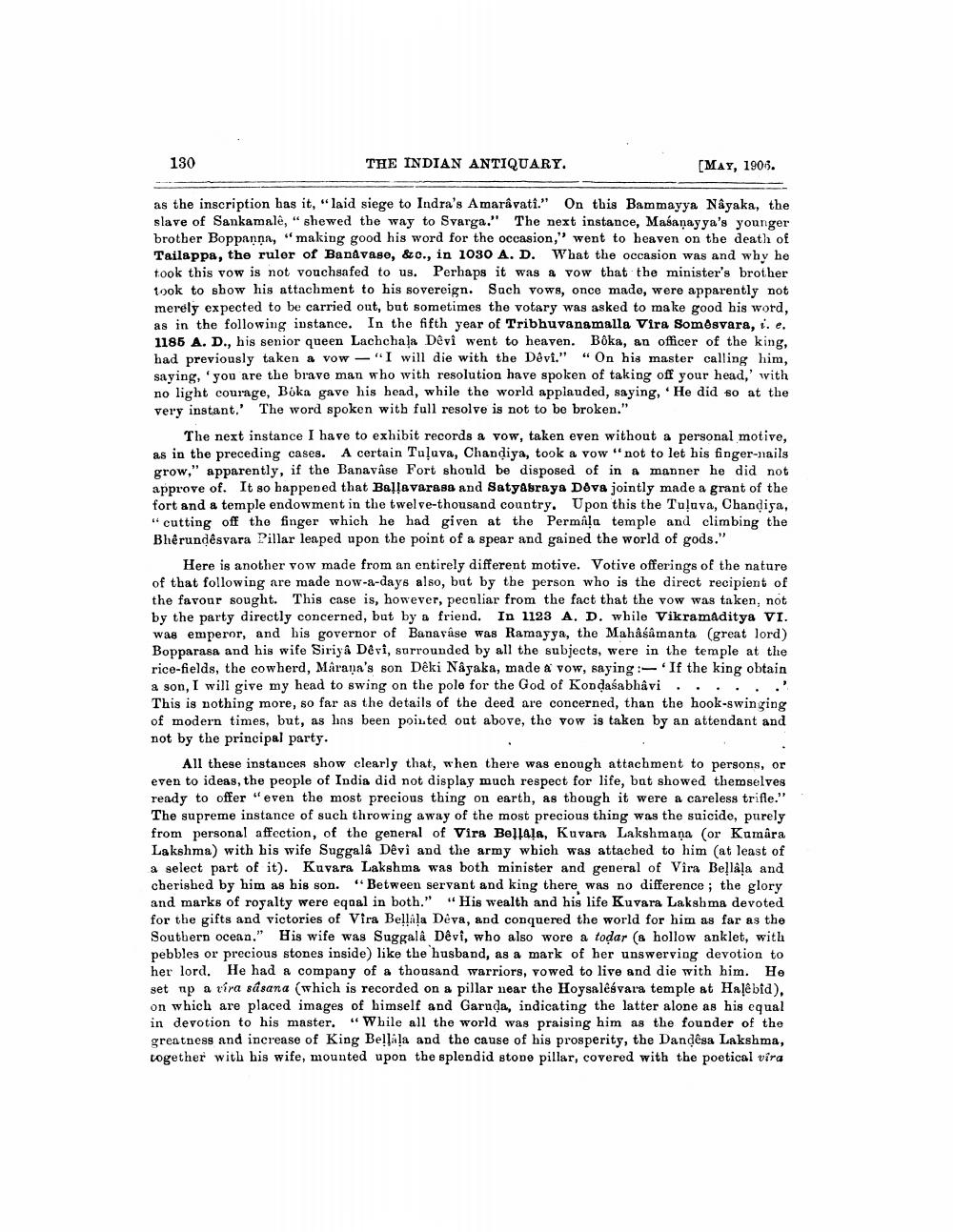________________
130
THE INDIAN ANTIQUARY.
[MAY, 1908.
as the inscription has it, "laid siege to Indra's Amaravati." On this Bammayya Nayaka, the slave of Sankamale," shewed the way to Svarga." The next instance, Masaņayya's younger brother Boppanna, "making good his word for the occasion,' went to heaven on the death of Tailappa, the ruler of Bankvase, &c., in 1030 A. D. What the occasion was and why he took this vow is not vouchsafed to us. Perhaps it was a vow that the minister's brother took to show his attachment to his sovereign. Sach vows, once made, were apparently not merely expected to be carried out, but sometimes the votary was asked to make good his word, as in the following instance. In the fifth year of Tribhuvanamalla Vira Somèsvara, i.e. 1185 A. D., his senior queen Lachchala Devi went to heaven. Bôka, an officer of the king, had previously taken a vow -"I will die with the Devi." "On his master calling him, saying, you are the brave man who with resolution have spoken of taking off your head,' with no light courage, Bóka gave his head, while the world applauded, saying, He did so at the very instant.' The word spoken with full resolve is not to be broken."
The next instance I have to exhibit records a vow, taken even without a personal motive, as in the preceding cases. A certain Tuļuva, Chandiya, took a vow "not to let his finger-nails grow," apparently, if the Banavase Fort should be disposed of in a manner he did not approve of. It so happened that Ballavarass and Satyasraya Deva jointly made a grant of the fort and a temple endowment in the twelve-thousand country. Upon this the Tuluva, Chandiga, "cutting off the finger which he had given at the Permala temple and climbing the Bherundêsvara Pillar leaped upon the point of a spear and gained the world of gods."
Here is another vow made from an entirely different motive. Votive offerings of the nature of that following are made now-a-days also, but by the person who is the direct recipient of the favour sought. This case is, however, pecnliar from the fact that the vow was taken, not by the party directly concerned, but by a friend. In 1123 A. D. while Vikramaditya VI. was emperor, and his governor of Banarase was Ramayya, the Mahasamanta (great lord) Bopparasa and his wife Siriya Dêri, surrounded by all the subjects, were in the temple at the rice-fields, the cowherd, Marana's son Dêki Nayaka, made a vow, saying: If the king obtain a son, I will give my head to swing on the pole for the God of Kondaśabhavi ......' This is nothing more, so far as the details of the deed are concerned, than the hook-swinging of modern times, but, as has been pointed out above, the vow is taken by an attendant and not by the principal party.
All these instances show clearly that, when there was enough attachment to persons, or even to ideas, the people of India did not display much respect for life, but showed themselves ready to offer "even the most precious thing on earth, as though it were a careless trifle." The supreme instance of such throwing away of the most precious thing was the suicide, purely from personal affection, of the general of Vira BelAA, Kuvara Lakshmana (or Kamara Lakshma) with his wife Suggalâ Devi and the army which was attached to him (at least of a select part of it). Kuvara Lakshma was both minister and general of Vira Bella!a and cherished by him as his son. “Between servant and king there was no difference; the glory and marks of royalty were equal in both." "His wealth and his life Kuvara Lakshma devoted for the gifts and victories of Vira Bellala Deva, and conquered the world for him as far as the Southern ocean." His wife was Suggala Devi, who also wore a todar (8 hollow anklet, with pebbles or precious stones inside) like the husband, as a mark of her unswerving devotion to her lord. He had a company of a thousand warriors, vowed to live and die with him. He set up a rira sásana (which is recorded on a pillar near the Hoysalesvara temple at Halebid). on which are placed images of himself and Garuda, indicating the latter alone as his equal in devotion to his master. "While all the world was praising him as the founder of the greatness and increase of King Bellala and the cause of his prosperity, the Dandêsa Lakshma, together with his wife, mounted upon the splendid stope pillar, covered with the poetical vira




